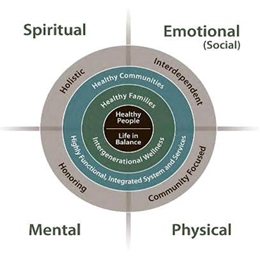Behavioral Health

ISSUE
The high rates of alcohol, substance use and mental health disorders, suicide, violence, and behavior-related morbidity and mortality in American Indian and Alaska Native communities continue to be disproportionately higher than the rest of the U.S. population. Studies show Indigenous people have disproportionately higher rates of mental health problems such as suicide, post-traumatic stress disorder, violence and substance use disorders. These high rates result in American Indian and Alaska Native people reporting serious psychological distress, 2.5 times more than the general population over a month’s time. Below are key statistics defining the health disparities experienced by the American Indian and Alaska Native population.
- Highest rates of suicide of any minority group within the U.S. and rates are increasing since 2003, as well as high rates of substance use disorder of both illicit drugs and alcohol use
- From 2016 to 2020, they experienced alcohol-related deaths at significantly higher rates (51.9/100,000) than the rest of the U.S. population (11.7/100,000 ) 1
- Highest prevalence of methamphetamine use, as well as methamphetamine use disorder, methamphetamine injection, and with significant increases in methamphetamine overdose 2
- In 2019 and 2020, drug overdose death rates were highest for non-Hispanic American Indian and Alaska Native people at 30.5 and 42.5 per 100,000, respectively
- From 2019-2020, the American Indian and Alaska Native overdose death rates increased by 39%
BACKGROUND
The last 30 years have seen the development of innovative approaches to addressing alcohol/substance use, social services, and mental health issues. The Indian Health Service brings much-needed attention to behavioral health and its relationship to the prevention of chronic disease, preventable mortality, and health promotion. The IHS is responsible for providing federal health services to American Indian and Alaska Native people and is the principle federal healthcare provider and health advocate for these populations. The Division of Behavioral Health, within the Office of Clinical and Preventive Services, provides integrated health and wellness services that are holistic and culturally appropriate. In addition to services, funding is made available through cooperative agreements and grants that focus on the development of behavioral health programs, as needed among Tribal Nations and their members. The following are active cooperative agreements and grants through DBH:
- Behavioral Health Integration Initiative
- Community Opioid Intervention Pilot Project
- Domestic Violence Prevention
- Preventing Alcohol Related Death through Social Detoxification
- Substance Abuse and Suicide Prevention
- Substance Abuse Prevention, Treatment and Aftercare
- Suicide Prevention, Intervention and Postvention
- Youth Regional Treatment Center Aftercare Program
- Zero Suicide Initiative
- Zero Suicide Initiative Coordinating Center
STATUS
In the ongoing effort to meet behavioral health challenges in Indian Country, support for tribal management and delivery of behavioral health services in their communities has grown. In the last decade, Tribes have increasingly contracted or compacted via the Indian Self-Determination and Education Assistance Act to provide these services. Currently, more than 50 percent of the mental health programs and over 90 percent of the alcohol and substance abuse programs are tribally operated. This evolution in behavioral healthcare delivery and management is changing the face of behavioral health services in Indian Country. Where IHS was previously the principal behavioral healthcare delivery system for American Indian and Alaska Native persons, there is now a less centralized and more diverse network of care provided by federal, tribal, and urban Indian health programs.
The documented connections between behavioral health issues and chronic diseases underscore the need for holistic and integrated solutions within local continuums of services. Service improvements rely on sustained collaboration between Indian health programs, Tribes, and policymaking bodies. Analyses and agreements at the local level require the field testing of innovative protocols, while remaining thoughtful on deep issues, such as historical trauma, cultural renewal, and community reinforcement in healing processes.
OPTIONS/PLANS
The IHS continues to develop and share effective programs throughout the Indian health system, with a focus on developing programs that are collaborative, community driven, and nationally supported. This effort seeks to establish effective long-term strategic approaches to address the range of behavioral health issues in Indian Country.
ADDITIONAL INFORMATION
For more information, please visit the Division of Behavioral Health website.
1 Centers for Disease Control and Prevention, National Center for Health Statistics. National Vital Statistics System, Mortality 1999-2020 on CDC WONDER Online Database, released in 2021.2 Han B, et al. Methamphetamine overdose deaths in the United States: Sex and racial/ethnic differences. JAMA Psychiatry DOI: 10.1001/jamapsychiatry.2020.4321 (2021).
March 2023
Download this Fact Sheet [PDF - 338 KB]


